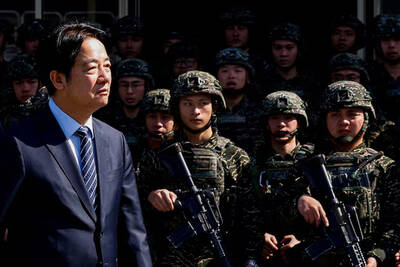The American Institute in Taiwan (AIT) put Taiwan in danger, Ma Ying-jeou Foundation director Hsiao Hsu-tsen (蕭旭岑) said yesterday, hours after the de facto US embassy said that Beijing had misinterpreted World War II-era documents to isolate Taiwan.
The AIT’s comments harmed the Republic of China’s (ROC) national interests and contradicted a part of the “six assurances” stipulating that the US would not change its official position on Taiwan’s sovereignty, Hsiao said.
The “six assurances,” which were given by then-US president Ronald Reagan to Taiwan in 1982, say that Washington would not set a date for ending arm sales to Taiwan, consult with China on arms sales to Taiwan, mediate between either side, revise the Taiwan Relations Act, change its official position on Taiwan’s sovereignty or pressure Taiwan to negotiate the issues with China.

Photo: Taipei Times
AIT officials appointed by the administration of former US president Joe Biden are inappropriately continuing the “cliches” of the previous administration and “manipulating” UN Resolution 2758, Hsiao said, asking AIT Director Raymond Greene whether he solicited US President Donald Trump’s opinion before making the remarks, or what Trump would think about his “reckless actions” that increase cross-strait tensions.
It does not seem to be Trump’s intention for Biden-appointed officials to continue the previous administration’s policies of manipulating Taiwan’s legal status, or acting in ways contrary to the interests and security of Taiwanese, he said.
If the AIT continues to backslide into the stance that Taiwan has an indeterminate legal status, the US would be changing the “six assurances” in a way that could undermine the already fraught cross-strait relationship, he said.
Reliance on the 1951 Treaty of San Francisco by those who advocate Taiwanese independence to justify claims that Taiwan has an indeterminate legal status is contrary to the Constitution and the historical fact that Japan returned Taiwan proper, as well as the Kinmen and Penghu archipelagos to the Republic of China, he said.
The 1943 Cairo Declaration, the 1945 Potsdam Declaration and the Japanese Instrument of Surrender are legally binding documents in the eyes of international law, Hsiao said, adding that the legal effect of the documents have never been questioned by the parties named in them.

The Taipei Mass Rapid Transit (MRT) Wanda-Zhonghe Line is 81.7 percent complete, with public opening targeted for the end of 2027, New Taipei City Mayor Hou You-yi (侯友宜) said today. Surrounding roads are to be open to the public by the end of next year, Hou said during an inspection of construction progress. The 9.5km line, featuring nine underground stations and one depot, is expected to connect Chiang Kai-shek Memorial Hall Station to Chukuang Station in New Taipei City’s Jhonghe District (中和). All 18 tunnels for the line are complete, while the main structures of the stations and depot are mostly finished, he

The first global hotel Keys Selection by the Michelin Guide includes four hotels in Taiwan, Michelin announced yesterday. All four received the “Michelin One Key,” indicating guests are to experience a “very special stay” at any of the locations as the establishments are “a true gem with personality. Service always goes the extra mile, and the hotel provides much more than others in its price range.” Of the four hotels, three are located in Taipei and one in Taichung. In Taipei, the One Key accolades were awarded to the Capella Taipei, Kimpton Da An Taipei and Mandarin Oriental Taipei. Capella Taipei was described by

Minister of Economic Affairs Kung Ming-hsin (龔明鑫) yesterday said that private-sector refiners are willing to stop buying Russian naphtha should the EU ask them to, after a group of non-governmental organizations, including the Centre for Research on Energy and Clean Air (CREA), criticized the nation’s continued business with the country. While Taiwan joined the US and its Western allies in putting broad sanctions on Russia after it invaded Ukraine in 2022, it did not explicitly ban imports of naphtha, a major hard-currency earner for Russia. While state-owned firms stopped importing Russian oil in 2023, there is no restriction on private companies to

President William Lai (賴清德) is expected to announce a new advanced “all-domain” air defense system to better defend against China when he gives his keynote national day speech today, four sources familiar with the matter said. Taiwan is ramping up defense spending and modernizing its armed forces, but faces a China that has a far larger military and is adding its own advanced new weapons such as stealth fighter jets, aircraft carriers and a huge array of missiles. Lai is expected to announce the air defense system dubbed “Taiwan Dome” in his speech this morning, one of the sources said. The system